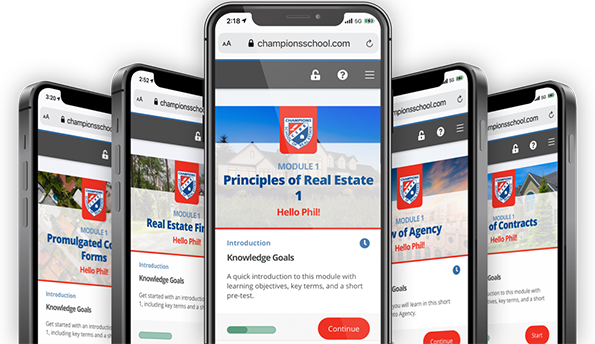
To become a managing brokerage, you will need to meet certain Illinois requirements. For licensure, you must have at least 20 years' experience in the industry. To pass the state examination and receive pre-licensing instruction,
The state requires that you complete 45 hours of pre-licensing courses before you can take the state exam. You have the option of a home-study or computer-based program. Or you can opt for a classroom course. All of these programs can be found through the private company PSI/AMP.
In order to qualify for the managing broker license, you must have passed the state exam, have at least two years of real estate experience, and have a valid license from another jurisdiction. Additionally, you must be affiliated with a licensed sponsoring broker. Once you have obtained your license, you will need to renew it every 2 years. You will need to have completed at most 24 hours of continuing educational and pay a renewal fees.

Agents working under the supervision of managing brokers are responsible for approbating transactions and overseeing their activities. Managing brokers are not usually able to meet with clients directly. While they are able to meet clients in person, the main function of managing brokers is to ensure their services conform with state laws.
When you are ready to take the Illinois Managing Broker Licensing Exam, you can study for it online or in a classroom. You can take self-paced online classes at many Illinois realty schools. These classes allow you to speed up the process of getting your license.
Once you have finished the pre-license education and pass the state exam, you need to go through the post-licensing course. This course includes 12 hours worth of continuing education which you can attend at your local college as well as online. A class in Sexual Harassment Prevention Training is required. You must also pass a background check.
When you take the managing broker license exam, you will be asked to answer 40 multiple-choice questions. A recommendation will be required. Finaly, the testing supervisor will give you a score report. Your score may require you to retake the part of the test you failed. You can take the exam 3 times.

Illinois is a difficult state to obtain a broker's license. You could spend up to $700, depending on how you do in your pre-license training and the results from your background check. A typical broker earns a mean salary of $103,430. Additionally, the Greater Chicago Area ranks among the top regions for real estate agents' employment.
Although you can learn how manage broker in a relatively short time, it is worth investing in the proper training. You can also purchase exam prep materials, which will provide you with useful materials and practice exams. Set up your social media and system accounts.
FAQ
What should you consider when investing in real estate?
The first step is to make sure you have enough money to buy real estate. If you don’t save enough money, you will have to borrow money at a bank. Aside from making sure that you aren't in debt, it is also important to know that defaulting on a loan will result in you not being able to repay the amount you borrowed.
You also need to make sure that you know how much you can spend on an investment property each month. This amount must include all expenses associated with owning the property such as mortgage payments, insurance, maintenance, and taxes.
It is important to ensure safety in the area you are looking at purchasing an investment property. It is best to live elsewhere while you look at properties.
How many times do I have to refinance my loan?
It all depends on whether your mortgage broker or another lender is involved in the refinance. You can typically refinance once every five year in either case.
What are the benefits associated with a fixed mortgage rate?
Fixed-rate mortgages guarantee that the interest rate will remain the same for the duration of the loan. This guarantees that your interest rate will not rise. Fixed-rate loans have lower monthly payments, because they are locked in for a specific term.
Can I afford a downpayment to buy a house?
Yes! Yes! There are many programs that make it possible for people with low incomes to buy a house. These programs include government-backed loans (FHA), VA loans, USDA loans, and conventional mortgages. More information is available on our website.
What is a Reverse Mortgage?
Reverse mortgages are a way to borrow funds from your home, without having any equity. It allows you to borrow money from your home while still living in it. There are two types available: FHA (government-insured) and conventional. You must repay the amount borrowed and pay an origination fee for a conventional reverse loan. FHA insurance will cover the repayment.
Statistics
- Private mortgage insurance may be required for conventional loans when the borrower puts less than 20% down.4 FHA loans are mortgage loans issued by private lenders and backed by the federal government. (investopedia.com)
- Based on your credit scores and other financial details, your lender offers you a 3.5% interest rate on loan. (investopedia.com)
- When it came to buying a home in 2015, experts predicted that mortgage rates would surpass five percent, yet interest rates remained below four percent. (fortunebuilders.com)
- This means that all of your housing-related expenses each month do not exceed 43% of your monthly income. (fortunebuilders.com)
- The FHA sets its desirable debt-to-income ratio at 43%. (fortunebuilders.com)
External Links
How To
How to find an apartment?
When you move to a city, finding an apartment is the first thing that you should do. Planning and research are necessary for this process. It involves research and planning, as well as researching neighborhoods and reading reviews. You have many options. Some are more difficult than others. The following steps should be considered before renting an apartment.
-
Researching neighborhoods involves gathering data online and offline. Online resources include Yelp. Zillow. Trulia. Realtor.com. Offline sources include local newspapers, real estate agents, landlords, friends, neighbors, and social media.
-
See reviews about the place you are interested in moving to. Yelp and TripAdvisor review houses. Amazon and Amazon also have detailed reviews. You can also check out the local library and read articles in local newspapers.
-
For more information, make phone calls and speak with people who have lived in the area. Ask them what they loved and disliked about the area. Ask them if they have any recommendations on good places to live.
-
Consider the rent prices in the areas you're interested in. If you think you'll spend most of your money on food, consider renting somewhere cheaper. If you are looking to spend a lot on entertainment, then consider moving to a more expensive area.
-
Find out all you need to know about the apartment complex where you want to live. How big is the apartment complex? What is the cost of it? Is it pet-friendly? What amenities are there? Are there parking restrictions? Are there any rules for tenants?